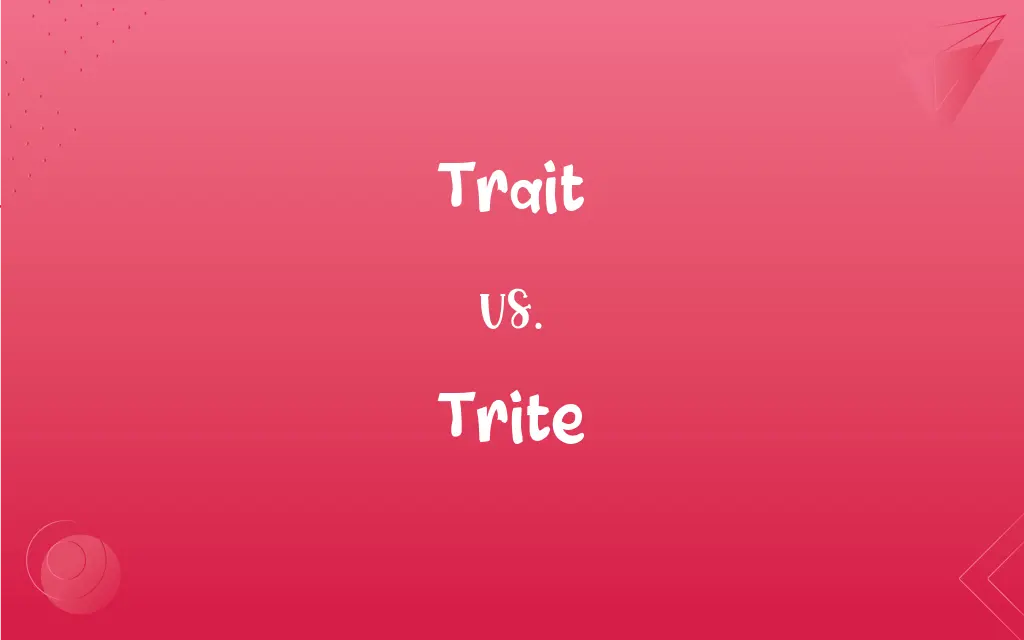Trait vs. Trite: What's the Difference?
By Harlon Moss || Updated on May 28, 2024
Trait refers to a distinguishing characteristic or quality, while trite describes something overused and lacking originality.

Key Differences
Trait is a term used to describe a distinguishing characteristic or quality in a person or thing. It can refer to physical attributes, personality aspects, or any notable feature that defines someone or something. Trite, on the other hand, refers to something that is overused and has lost its originality and impact. It describes ideas, expressions, or concepts that have become cliché due to excessive repetition.
Trait emphasizes uniqueness and distinctiveness, making it a term frequently used in positive or neutral contexts to highlight specific qualities. For example, kindness is a positive personality trait. In contrast, trite carries a negative connotation, implying that something is dull or uninteresting because it has been seen or heard too often. For instance, using trite expressions in writing can make the work seem uninspired.
The usage of trait is common in discussions about individual differences and characteristics. It helps in identifying and appreciating what makes someone or something special. Trite, however, is commonly used in critiques to point out the lack of originality, urging for more creative and novel approaches.
Comparison Chart
Definition
A distinguishing characteristic or quality
Overused and lacking originality
Context
Positive or neutral, describing uniqueness
Negative, describing lack of freshness
ADVERTISEMENT
Common Usage
Genetics, personality, distinguishing features
Language, literature, critique
Connotation
Positive or neutral
Negative
Example Usage
Identifying unique qualities
Critiquing overused expressions
Trait and Trite Definitions
Trait
A feature that defines someone or something.
His sense of humor is a notable trait.
Trite
Hackneyed and stale due to overuse.
Avoid writing trite stories that readers have seen before.
ADVERTISEMENT
Trait
A distinguishing characteristic.
Honesty is a valuable trait in a friend.
Trite
Overused and lacking in originality.
The speech was full of trite phrases.
Trait
A distinguishing feature, as of a person's character.
Trite
Lacking freshness or novelty.
The movie relied on trite humor that failed to amuse.
Trait
A morphological, physiological, or behavioral feature of an organism.
Trite
Clichéd and unoriginal.
His arguments were trite and unconvincing.
Trait
(Archaic) A short line or mark made with a writing or drawing implement.
Trite
Commonplace and stale.
The novel's ending was disappointingly trite.
Trait
An identifying characteristic, habit or trend.
The number one personality trait I hate is hypocrisy. Why can't you be consistent!?
Trite
Not evoking interest because of overuse or repetition; hackneyed.
Trait
(object-oriented) An uninstantiable collection of methods that provides functionality to a class by using the class’s own interface.
Traits are somewhat between an interface and a mixin.
Trite
Often in reference to a word or phrase: used so many times that it is commonplace, or no longer interesting or effective; worn out, hackneyed.
Trait
A stroke; a touch.
By this single trait Homer makes an essential difference between the Iliad and Odyssey.
Trite
(legal) So well established as to be beyond debate: trite law.
Trait
A distinguishing or marked feature; a peculiarity; as, a trait of character.
Trite
A denomination of coinage in ancient Greece equivalent to one third of a stater.
Trait
A distinguishing feature of your personal nature
Trite
Trite, a genus of spiders, found in Australia, New Zealand and Oceania, of the family Salticidae.
Trait
A genetically determined characteristic.
Eye color is an inherited trait.
Trite
Worn out; common; used until so common as to have lost novelty and interest; hackneyed; stale; as, a trite remark; a trite subject.
Trait
A specific quality in a person's behavior.
Leadership is an important trait for a manager.
Trite
Repeated too often; overfamiliar through overuse;
Bromidic sermons
His remarks were trite and commonplace
Hackneyed phrases
A stock answer
Repeating threadbare jokes
Parroting some timeworn axiom
The trite metaphor `hard as nails'
Trait
An identifying attribute.
The ability to stay calm under pressure is a great trait.
FAQs
What does trait mean?
Trait refers to a distinguishing characteristic or quality in a person or thing.
Can you give an example of a trait?
e.g., Patience is a valuable trait in a teacher.
How is trait used in genetics?
In genetics, a trait is an inherited characteristic, such as eye color or height.
Can a personality trait be trite?
No, a personality trait cannot be trite; traits describe uniqueness, while trite describes overuse.
What does trite mean?
Trite means something that is overused and lacking originality.
Is trite always negative?
Yes, trite typically carries a negative connotation, implying something is dull or unoriginal.
Is trait always positive?
No, a trait can be positive, negative, or neutral, depending on the context.
What is a synonym for trait?
Characteristic is a synonym for trait.
How do you use trait in a sentence?
e.g., Creativity is an important trait for an artist.
Can something trite become original again?
Typically, once something is deemed trite, it is challenging to restore its originality.
Can you give an example of something trite?
e.g., The movie's plot was trite and predictable.
How is trite used in writing?
Trite is used to describe phrases or ideas that are cliché and lack freshness in writing.
What is a synonym for trite?
Cliché is a synonym for trite.
How do you use trite in a sentence?
e.g., The dialogue in the movie was filled with trite expressions.
Are traits always inherited?
Not always; some traits are learned or developed through experience.
Is a trait always visible?
No, traits can be internal qualities, such as kindness or intelligence.
How can you avoid trite expressions in writing?
Use fresh, creative language and avoid clichés to keep your writing original and engaging.
What is the difference between trait and trite?
Trait describes a unique characteristic, while trite describes something overused and unoriginal.
Can an idea be a trait?
No, traits refer to characteristics or qualities, not ideas.
Can trite be used to describe actions?
Yes, trite can describe actions that are overused and lack originality.
About Author
Written by
Harlon MossHarlon is a seasoned quality moderator and accomplished content writer for Difference Wiki. An alumnus of the prestigious University of California, he earned his degree in Computer Science. Leveraging his academic background, Harlon brings a meticulous and informed perspective to his work, ensuring content accuracy and excellence.































































